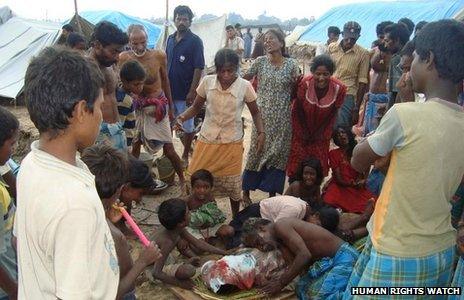Commonwealth faces 'real test' on Sri Lanka
- Published

Both sides were accused of human rights abuses throughout the conflict
Sri Lanka's punishing 26-year civil war ended in May 2009, but the story of the last six months of a brutal conflict will not go away.
Now alleged war crimes are being pushed onto the agenda of the Commonwealth.
"Bad things happen in war, but there has to be a full accountability by both the government and the opposition for war crimes," Canada's Foreign Minister, John Baird, told me on a visit to London for the Commonwealth Ministerial Action Group, external (CMAG).
Canada is now leading the charge to deny Sri Lanka the privilege of hosting this year's Commonwealth Heads of Government Summit in November unless it makes progress on a list of human rights concerns, including "meaningful reconciliation" with its Tamil community.
John Baird: "We don't think Sri Lanka should be hosting the Commonwealth"
The UN says at least 40,000 civilians, mainly Tamils, died in the last months of the protracted war between government forces and Tamil Tiger rebels. Other sources say the real figure is much higher.
"We find it absolutely appalling that Sri Lanka would be taking on a leadership role in the Commonwealth," emphasised Mr Baird after a meeting of the CMAG, which describes itself as "the custodian of Commonwealth values and principles".
'Unfair'
Sri Lanka is hitting back in equal measure.
In a telephone interview from the capital, Colombo, cabinet spokesman Keheliya Rambukwella accused Canada of being "very biased, very unfair".
Asked about calls from Canada and leading human rights groups for an independent, international probe into accusations of war crimes, Mr Rambukwella repeated his government's rejection of outside involvement, saying it had its own commission and reconciliation process.
Sri Lankan cabinet spokesman Keheliya Rambukwella: "We feel they are very biased and very unfair."
The cabinet spokesman accused Ottawa of playing to the large Tamil diaspora in Canada.
Despite Sri Lankan government efforts to rebuild areas ravaged by years of war, Tamil communities outside and inside the country remain critical of Colombo's efforts to reintegrate a population still deeply traumatised by a devastating war.
Mr Rambukwella insisted: "The Tamil people are much happier today."
'Real test'
With only months to go until November's summit, it is not clear what impact Canada's very public intervention will have.
Bangladesh's Foreign Minister, Dr Dipu Moni, told the BBC World Service's Newshour programme that her country would attend a summit in Colombo, but said: "We are urging our close neighbour and friend to take all necessary steps to fulfil accountability."
Commonwealth Secretary General Kamalesh Sharma said on Friday that he saw no reason to deny Sri Lanka the honour of staging the next summit.
He told a news conference in London that Sri Lanka was "engaged and willing" to improve the situation.
However, Mr Baird said he had seen nothing to cause him to advise Canada's Prime Minister, Stephen Harper, to change his position on Colombo's human rights record.
Yet again, this 54-member organisation - mainly former British colonies - is confronting divisions in its ranks on human rights.
In recent years, heated arguments over everything from gay and lesbian rights to military coups have made their way onto their agenda.
Mr Baird pointed out that the Commonwealth recently "raised the bar" by drawing up a charter that details "shared values" of democratic development and human rights. It was signed by Queen Elizabeth, who heads the Commonwealth, last month.
"I think this is a real test," Mr Baird emphasised.